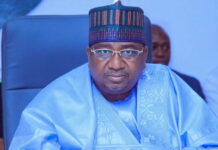The Federal Executive Council (FEC) on Wednesday received scorecard of Ministry of Justice from 2015 to 2017 which showed among others, savings to the government of N4.5 trillion from litigations and completed cases.
Abubakar Malami, the Minister of Justice and Attorney-General of the Federation, while briefing State House Correspondents, said the performance was in multiple areas, including sector reforms and prison decongestion.
According to him, Federal Government created a committee charged with the duty of formulating policies and strategies for prison decongestion nationwide.
He said “over 70 per cent of prison inmates are awaiting trial.
“There were sizable numbers that could not pay limited funds imposed on them arising from their convictions.
“There were those who were awaiting trial but never saw the court rooms for five years and above.
“And indeed, there were multiple legislations before the National Assembly intended to support the decongestion of prison formation process.
“We presented our scorecard in that respect and what the committee was doing, where we are and what had been achieved so far in terms of decongestion process.
“We equally presented a scorecard as to the cases both civil and criminal prosecuted by the Ministry of Justice and their implication as to savings as done to government from 2015 to the present time.
“Fundamentally arising from the cases that were conducted by Federal Ministry of Justice, the ministry succeeded in saving the government around N4.5 trillion relating to claims presented in respect to these cases which were conducted and concluded.’’
The Minister also said that the scorecard included private, executive and associated legislations processed under the period and the achievements, adding that it included the prosecution of on-going Boko Haram cases at Kainji.
He said FEC was informed of the number of cases prosecuted, number of convictions procured and number of discharges made in that respect.
He noted that a presentation was made for the road map for the continuation of the process particularly in respect of Giwa Barracks in Borno.
He explained that other presentations included the plea bargain as there were offers made for plea bargain “in respect of pending criminal cases where the accused persons standing trials made offers’’ which the ministry sought direction from FEC.
Malami said that a presentation was also made about the national prosecution team as it related to cases expected to prosecute and what had been done in that respect.
In a related development, the Minister of Foreign Affairs, Mr Geoffrey Onyeama, presented report of three projects being carried out by the ministry to strengthen economic diplomacy and summary of special interventions made to various embassies.
He said “with regard to the projects, we were undertaking the first one on economic diplomacy initiative.
“This essentially entails cooperation with Ministry of Industry, Trade and Investment where we have the foreign ministry as an interface.
“We developed a portal which will be available to all businesses in Nigeria where we will be leveraging on 110 countries which we have permanent presence.
“This portal will provide Nigerian business access to 110 market access tool around the world and we will have a trade representative in each embassy and any business person can upload information which will be downloaded in all embassies.
“Each embassy will be required to look for a match around the world.’’
Onyeama explained that the portal was a market access tool to remove bottlenecks associated with getting access into the export business.
He also said that foreign businesses seeking access Nigerian markets would also utilize the portal, adding that the portal would promote Foreign Direct Investment, reverse brain drain and promote market access for Nigerians.
Another project was the Process Review, essentially a desk- to- desk review of the ministry and all the country’s embassies.
He said the third project was a citizenship diplomacy programme being a call centre in which any distressed Nigerian in the World could call a phone number in times of distress and be attended to promptly.
The minister mentioned the special intervention fund provided by President Muhammadu Buhari to rescue Nigerian embassies in financial difficulties.
He said that in 2016, the president released N16.3 billion which was distributed to all the embassies, adding that the second intervention was N933 million released for renovations and other debts in the embassies in October 2017.
He said the third was 32 million dollars for critically distressed 65 missions in serious debt and crisis which was approved in November 2017.
Onyeama noted that the ministry was in the process of distributing the amount to the affected embassies, adding that another intervention of N7 billion was made for the ministry’s headquarters.
He said some embassies had 10 years debt overhang and Buhari had insisted that Nigerians would no longer work under such conditions abroad.
The Minister of Science and Technology, Dr Ogbonnaya Onu, said FEC approved three policies for the ministry.
He mentioned the approval for Science Technology and Innovation Road Map 2017 to 2030 in respect of the Economic Recovery and Growth Plan to move the economy from a resource-based to knowledge-based economy.
He said a national strategy for competiveness was also approved to avoid importation of raw materials and products which hit N49 trillion between 2010 and 2016.
He noted that the target was to save more than N1 trillion from such importation in the next five years.
Onu said the last policy was the Executive Order 5, a revolutionary order that had tremendous potential for the country by promoting self-reliance.
Accordingly, he said, the ministry entered into MoU with an indigenous company for the manufacture on nutrition-rich biscuits for management of malnutrition.
He said it was the result of the linkage between research findings and manufacturing. (NAN)



